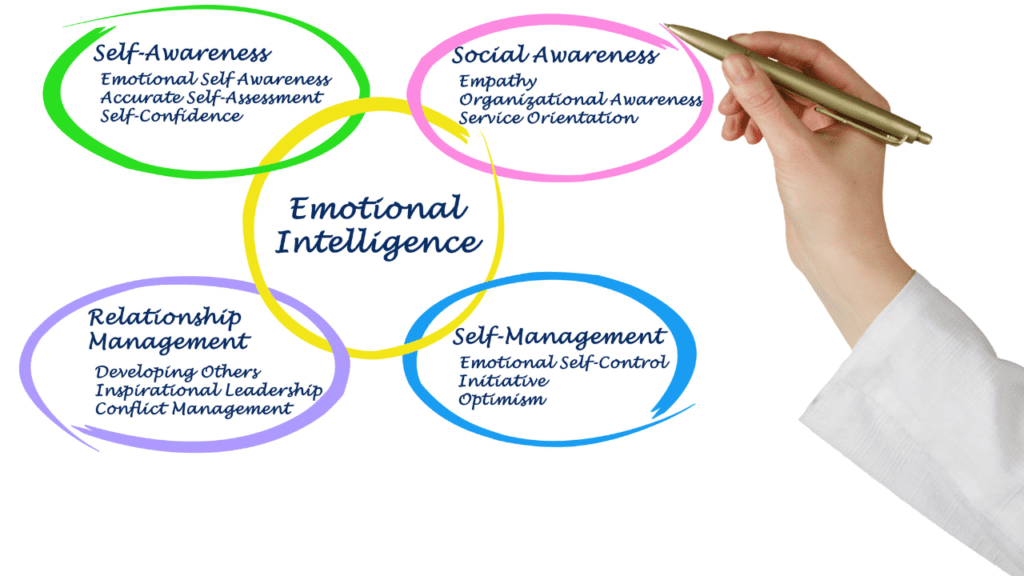In the intricate domain of life coaching, developing Emotional Intelligence is paramount. A core element of this process is fostering Emotional Self-Perception and establishing Habits for Emotional Stability. These aspects provide the foundation for more effective interaction with oneself and others, leading to significant personal and professional growth.
Understanding the role of Emotional Intelligence in Life Coaching can transform both personal and professional relationships.
The role of Emotional Intelligence in Life Coaching is particularly crucial as it lays the groundwork for personal growth.
Through Emotional Intelligence in Life Coaching, individuals can better manage stress and develop resilience.
This journey reflects the importance of Emotional Intelligence in Life Coaching for developing interpersonal skills.
Emotional Intelligence in Life Coaching empowers individuals to navigate their emotions effectively and build stronger relationships.
When emotional intelligence is cultivated, individuals gain not only greater control over their reactions but also the ability to engage with others in more meaningful and authentic ways. This capacity strengthens resilience, improves communication, and nurtures long-term personal growth.
Through the lens of neuroscience, life coaching sheds light on the importance of brain-based coaching strategies and the mechanisms of neuroplasticity. This perspective harnesses our understanding of how the brain adapts and restructures neural pathways, which is crucial in emotional self-awareness and stability.
The recognition that the brain can change provides hope for anyone who has struggled with unhelpful emotional patterns, demonstrating that transformation is not only possible but sustainable.
Understanding Emotional Self-Awareness
Emotional self-awareness is the conscious understanding of one’s emotions. It’s about recognizing what you’re feeling at any given moment and understanding the impact of those emotions on your thoughts and actions. This awareness becomes the stepping stone towards controlling impulsive decisions and fostering a sense of empathy for others.
Mastering Emotional Intelligence in Life Coaching fundamentally changes how clients perceive their emotional landscape.
Incorporating Emotional Intelligence in Life Coaching not only enhances client outcomes but also fosters a supportive learning environment.
Inaccurate self-assessment can lead to a significant gap in judgment, impacting decision-making and relationships. High self-awareness allows individuals to be calm and collected, enhancing their personal and professional interactions.
Developing Emotional Intelligence in Life Coaching aids in building a strong foundation for emotional health.
These strategies focus on the development of Emotional Intelligence in Life Coaching, promoting stability and control.
Understanding Emotional Intelligence in Life Coaching can lead to profound shifts in behavior and communication.
Emotional Intelligence in Life Coaching
In the context of life coaching, emotional intelligence is the ability to understand and manage one’s emotions and the emotions of others. This involves self-comprehension, self-regulation, motivation, empathy, and social skills.
Coaching that integrates emotive intelligence focuses on developing these capabilities, providing clients with tools and techniques to manage emotions effectively. Neuroscience-based coaching approaches have shown promising results, teaching individuals to rewire their neural pathways for better emotional control and empathy.
Low self-awareness can severely hinder the development of Emotional Intelligence in Life Coaching.
Building Habits for Emotional Stability
Life coaching that emphasizes Emotional Intelligence in Life Coaching can significantly enhance overall effectiveness.
By focusing on Emotional Intelligence in Life Coaching, individuals can achieve greater self-regulation and emotional balance.
Ultimately, integrating Emotional Intelligence in Life Coaching leads to remarkable transformations.
Habits for emotional stability revolve around developing strategies that help manage emotional responses effectively. They involve being present at the moment, understanding the emotional triggers, and responding to them instead of reacting impulsively.
Building these habits is an integral part of life coaching. It allows individuals to understand their emotions better, helping them navigate different situations with more resilience and less stress.
The Neuroscience Perspective
Neuroscience offers invaluable insights into the intricate workings of our brain, enabling us to understand the mechanisms behind emotional self-perception and stability.
Neuroplasticity, the brain’s ability to reorganize itself by forming new neural connections, plays a crucial role in this process. By understanding and harnessing the power of neuroplasticity, life coaches can guide their clients toward lasting emotional health and stability.

Discover the transformative impact of life coaching.
Low Self-Awareness: A Roadblock to Emotional Stability
Low self-knowledge can lead to a disconnect with emotions and hasty decision-making. It may make individuals feel surprised by their emotional responses under pressure or struggle to articulate their feelings accurately. These issues can hamper the development of empathy, a key component of emotional intelligence.
Life coaching can address these challenges by helping individuals explore their emotions more intensely, enhancing self-awareness and emotional stability.
Conclusion: Emotional Self-Awareness is the Way Forward
Life coaching that integrates emotional intelligence, the ability to assess one’s emotions, and creates astute skills in understanding one’s feelings can significantly improve personal and professional growth. The neuroscience-based approach offers promising ways to understand and enhance these aspects, leading to emotional health and overall well-being.
Interested in harnessing Emotional Intelligence in Life Coaching and fostering emotional stability in your life?
For further insights, read: Dopamine and Mood Swings: The Neuroscience-Based Approach to Emotional Stability
, , , , , , ,









